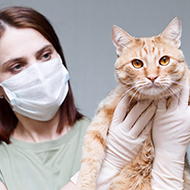
Animal-to-human transmission still 'low risk' to public health.
A study led by the University of Glasgow has identified two cases of human-to-cat SARS-CoV-2 transmission, found as part of a COVID-19 screening programme of the UK's feline population.
The infected cats were both different breeds and came from two separate households where a human resident had previously displayed COVID-19 symptoms.
According to the researchers, both animals displayed mild to severe respiratory signs. However, one of the cats – a four month-old female ragdoll kitten – sadly had to be euthanised after its condition deteriorated.
Researchers at the MRC-University of Glasgow Centre for Virus Research (CVR) completed full genome sequencing of the SARS-CoV-2 genome in the other cat – a six year-old female Siamese – and found that it was very similar to viral genomes circulating in humans.
Currently there is no evidence of cat-to-human COVID-19 transmission, or that cats, dogs or other domestic animals play a role in the epidemiology of human Covid infections.
However, the researcher team states that these two known cases of human-to-cat transmission in the UK are likely to be an underestimate of the true frequency of human-to-animal transmission, as animal testing is limited.
Professor Margaret Hosie from the MRC-University of Glasgow Centre for Virus Research, lead author of the study, said: “These two cases of human-to-animal transmission, found in the feline population in the UK, demonstrate why it is important that we improve our understanding of animal SARS-CoV-2 infection.”
“Currently, animal-to-human transmission represents a relatively low risk to public health in areas where human-to-human transmission remains high.
“However, as human cases decrease, the prospect of transmission among animals becomes increasingly important as a potential source of SARS-CoV-2 reintroduction to humans. It is therefore important to improve our understanding of whether exposed animals could play any role in transmission.”



 The latest
The latest